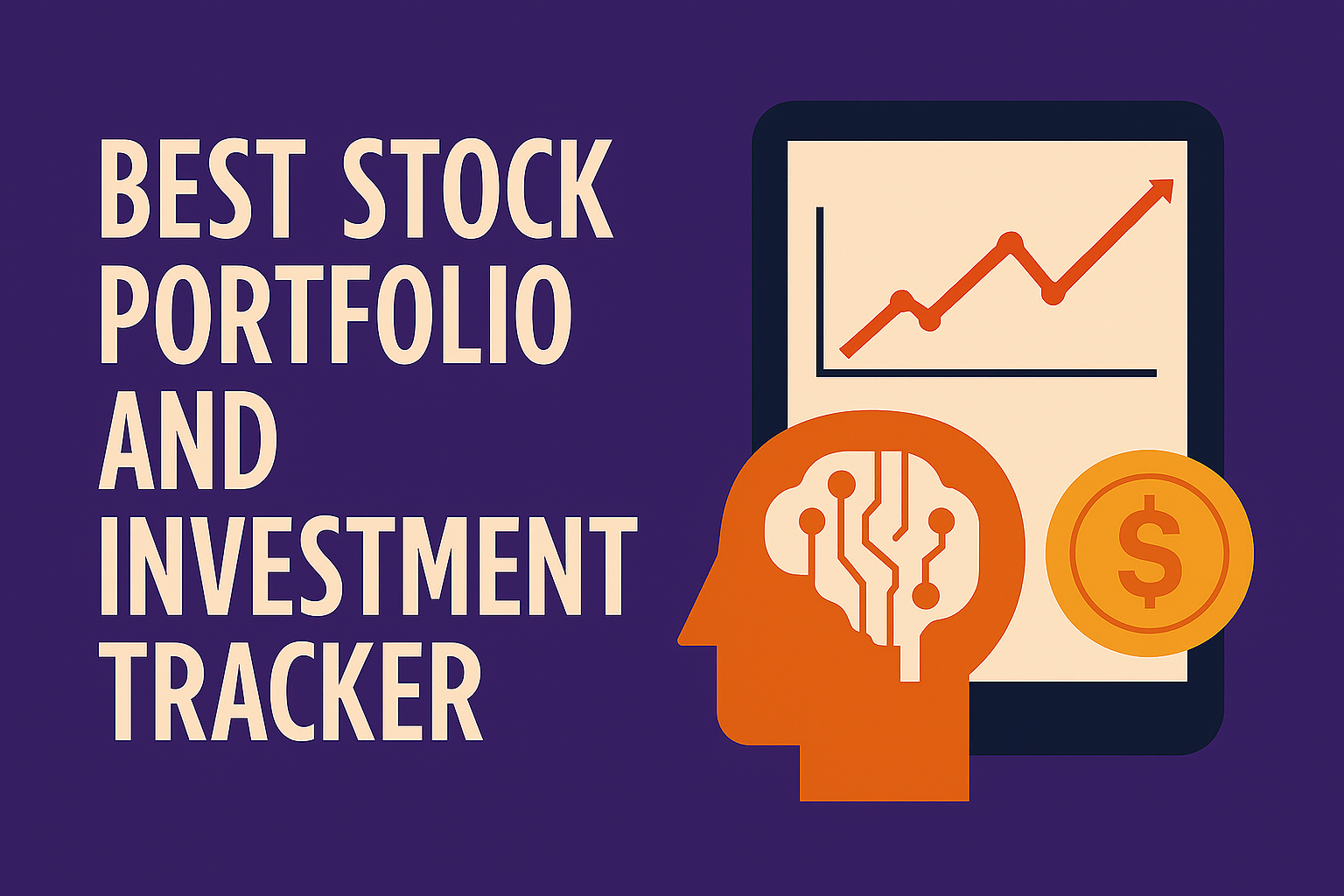When it comes to managing Best Stock Portfolio and Investment Tracker, having the right tools to evaluate the performance of assets, distribute them, and make sound financial decisions is fundamental.
The most efficient tools available provide real-time updates, analyses of user’s portfolios, and customized reports that offer invaluable assistance to investors so that they may remain ahead of the game.
These services make it easy for beginner and experienced investors alike to monitor their investments in stocks, ETFs and cryptocurrencies, while smart visualization of the data and advanced financial planning tools take the guesswork out of maximizing returns and minimizing risks.
What is a Stock Portfolio Tracker?
It allows you to follow changes in value for the various tradable assets contained in your financial portfolio. The tracking feature allows you to monitor the current balance and how well it correlates with your long-term goals, as well as how your portfolio is performing in relation to the wider financial marketplace.
Trackers are quite simple, and they come with comprehensive analytics, as well as integrations with automated brokering and stock screener services. Most importantly, you are able to monitor your current holdings as well as potential stock candidates you are working on.
Key Point
| Tracker Name | Key Features |
|---|---|
| Seeking Alpha | Analyst ratings, quant scores, news, earnings calendar |
| Empower (Personal Capital) | Syncs accounts, asset allocation, fee analyzer, retirement planner |
| Yahoo Finance | Real-time quotes, watchlists, news, customizable charts |
| Morningstar | Portfolio X-Ray, risk metrics, fund ratings |
| Kubera | Global asset tracking, crypto, real estate, bank sync, net worth dashboard |
| Delta Investment Tracker | Multi-asset support, real-time alerts, sleek mobile UI |
| CoinStats | Wallet sync, DeFi tracking, tax reports, multi-chain support |
| Sharesight | Capital gains, dividend tracking, tax-ready reports |
| Zerion | Wallet integration, NFT tracking, yield farming dashboard |
| Stock Rover | Screener, valuation models, portfolio analytics |
1. Seeking Alpha
Seeking alpha serves as an impressive investment insights and analytics tool that supports both day and period traders. From stock analysis to earnings call transcripts to quant ratings and crowd-sourced insights, Seeking Alpha offers a wealth of stock information.
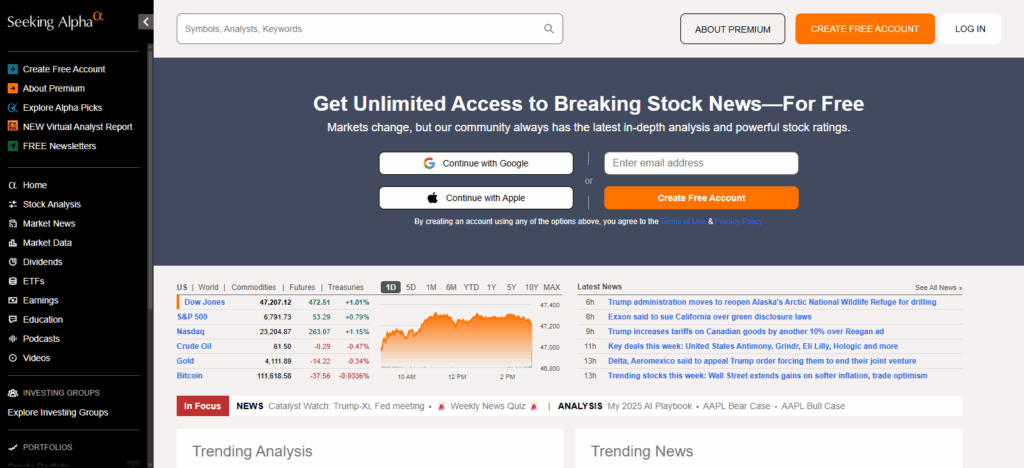
Users can see real-time tracking of performance metrics, dividends, and valuation metrics with the Portfolio Tracker. Research-driven investors looking for actionable insights and data-backed recommendations will find Seeking Alpha extremely useful.
Accessible tools come with the free version, while the Premium version (approximately $239 yearly) offers full access to quant ratings, top-rated stock picks, and exclusive articles. Seeking Alpha stands out for stock portfolio tracking due to its rich analytics and community-driven insights.
Seeking Alpha Pros & Cons
Pros:
- Provides a plethora of user-driven information which enables various insights for the stocks.
- Quant Ratings and stocks and author insight analysis help in decision making and weighing alternatives.
- Updates and alerts on the market as they happen.
- Research reports and analysis in the premium tier.
Cons:
- Overwhelming information can be difficult for beginners and novice level investors.
- In many cases, the quality of information is bad as it is crowd sourced.
- In some cases, some bare asset classes may be inadequately represented within the system.
- Users suffering slow customer support.
2. Empower (formerly Personal Capital)
Empower is a comprehensive wealth management and investment tracking platform for affluent clients and retirement planners. It connects to you bank accounts, brokerages, and retirement accounts for a consolidated net worth snapshot.
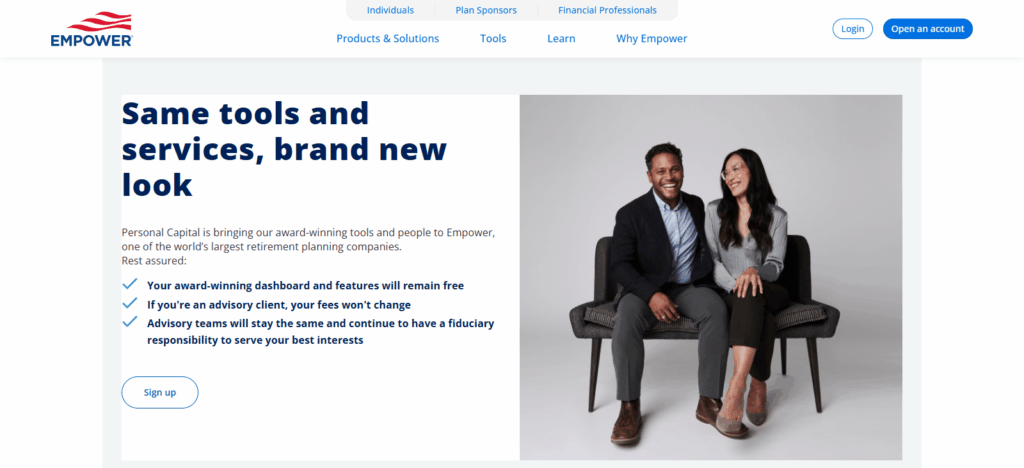
Empower offers a retirement planner, fee analyzer, and asset allocation summary. It’s suited for users who wish to conduct long-term financial planning rather than active trading.
The financial dashboard is free and wealth management is 0.89% AUM per year. Empower is among the best stock portfolio and investment trackers for people who prefer to have all their financial affairs managed in one platform.
Empower (formerly Personal Capital) Pros & Cons
Pros:
- Streams of investment, net worth and retirement funds gives a concise overall picture.
- Provides automated real-time updates from all linked accounts.
- Includes reminders and planning assistants for retirement.
- Simple format with good graphics.
Cons:
- Subscription fees which boast a low value may be charged.
- Ever changing fee schedules with low asset value.
- Does not allow as much custom planning as other services in the marketplace.
- Users with unmanaged funds could be subject to harsher penalties.
3. Yahoo Finance
Casual investors who want an uncomplicated and easily accessible method to track stocks and market news continue to prefer Yahoo Finance. Its portfolio tracker enables users to construct watchlists, assess real-time prices, and analyze historical data charts.
Yahoo Finance serves users best on a complimentary basis and intermediate investors who appreciate its easy to use interface containing basic features.
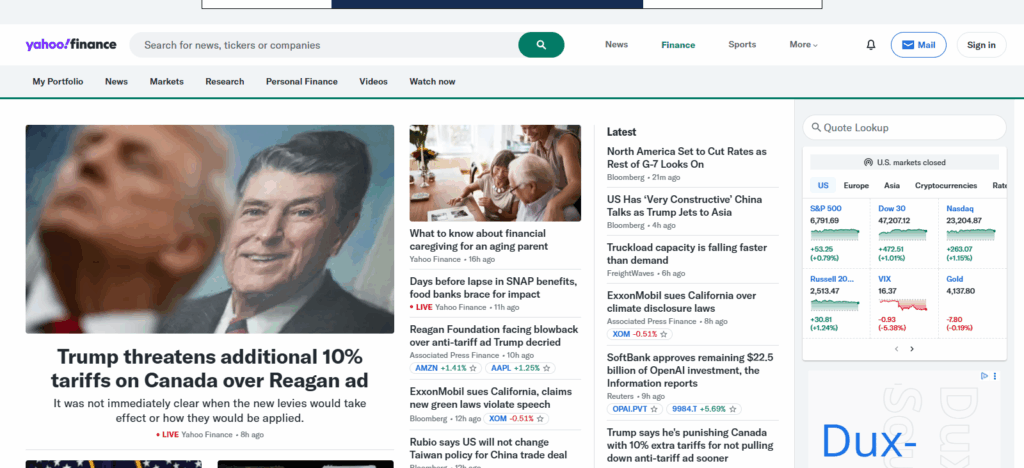
Most of the features are accessible for free, while Yahoo Finance Plus (starting at $20.83/month) offers advanced charting, research reports, and portfolio analytics.
Yahoo Finance has positioned itself as a stock portfolio and investment tracker and it is evident that it is designed to provide everyday investors with an optimal balance of simplicity and functionality.
Yahoo Finance Pros & Cons
Pros:
- Freely downloadable with premium plans available.
- Simplistic interface for viewing stocks and ETFs.
- Construct portfolios for the tracking of real-time movements.
- Provides news, market analytics, and alerts.
Cons:
- Premium features lack compared to rival platforms.
- High level features can be challenging.
- Data skews reported by users.
- Broker integration is bare minimum.
4. Morningstar
With its extensive fundamental research and mutual fund ratings, Morningstar has become a household name among long-term investors and financial advisors. Its deep fundamental analysis and mutual fund ratings is what makes Morningstar a household name.
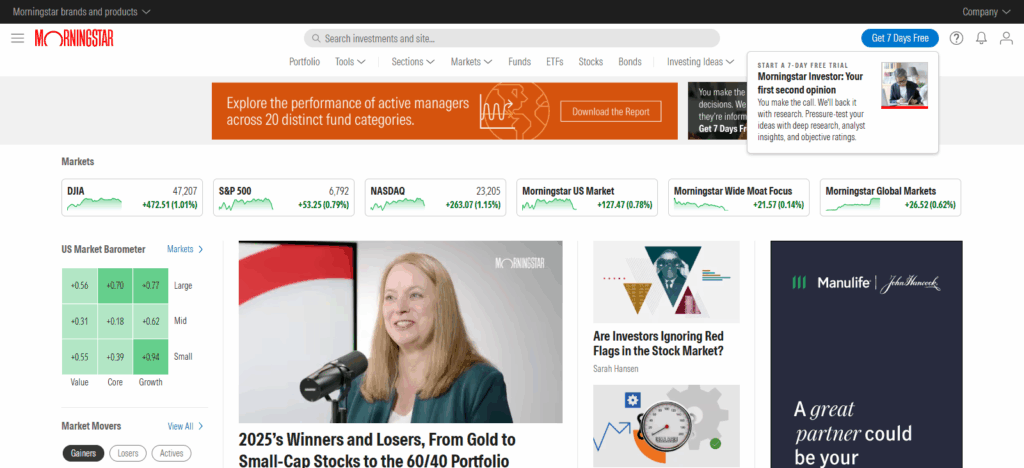
Morningstar is suitable for investors and advisors who wish to improve their asset class and valuation research, and performance analytics. Morningstar Premium ($249/year) unlocks analyst reports, screeners, and portfolio assessment.
As a stock portfolio and investment tracker, Morningstar is known for its institutional-grade research.—
Morningstar Investor Pros & Cons
Pros:
- Conducts thorough research on individual stocks, as well as mutual funds and ETFs.
- Reputation for providing impartial, standalone evaluations.
- Proprietary tools and algorithms to conduct detailed portfolio assessments.
- Focused on the construct of the portfolio and the s with a longer horizon.
Cons:
- High cost subscription model.
- More difficult than other software in the space.
- Lacks in coverage of certain asset classes.
- Not meant for those who trade frequently.
5. Kubera
Like Differ, Kubera is a portfolio tracker and holder of net worth., Kubera is tailored for high net worth people who seek a single source solution for their Traditional and Alternative assets. These include real estate, collectibles, global bank accounts, cryptocurrencies, and even domain names.
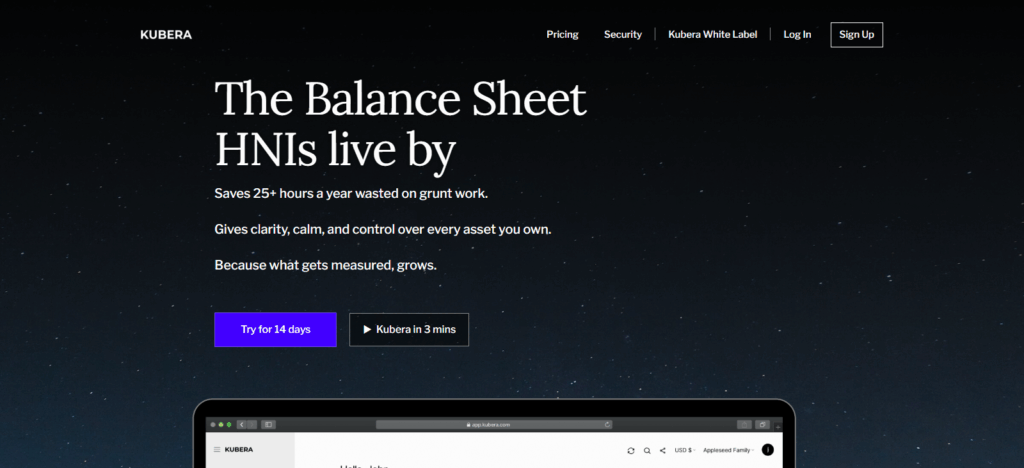
As a value of privacy, he also appreciates the user friendly ad free interface. Unlike Differ, Kubera does not offer investment guidance or trading functionalities. His net worth tracking is also much more accurate than Differ.
His pricing starts at $150/year. As a stock portfolio and investment tracker, privacy centric Kubera is unparalleled and the perfect solution for people with assets sophisticated in diversity and holdings across different countries.
Kubera Pros & Cons
Pros:
- Integrates various data for stocks, real estate, and crypto.
- Supports various currencies and offers a unified snapshot of net worth exercises.
- Electronic platform with pleasant color combinations.
- Links with financial institutions and trading platforms for holdings.
Cons:
- Relatively expensive subscriptions, with no free versions.
- Absence of any system for allocating expenditures.
- Pricing for certain customers.
- Missing key features for thorough data analysis.
6. Delta Investment Tracker
Delta is a nifty portfolio tracker and investment holder. He is mobile friendly and focuses on investments of stocks, ETFs, crypto and even NFTs. Unlike Differ, Delta is more suited for investors who are tech friendly and desire real time notifications.
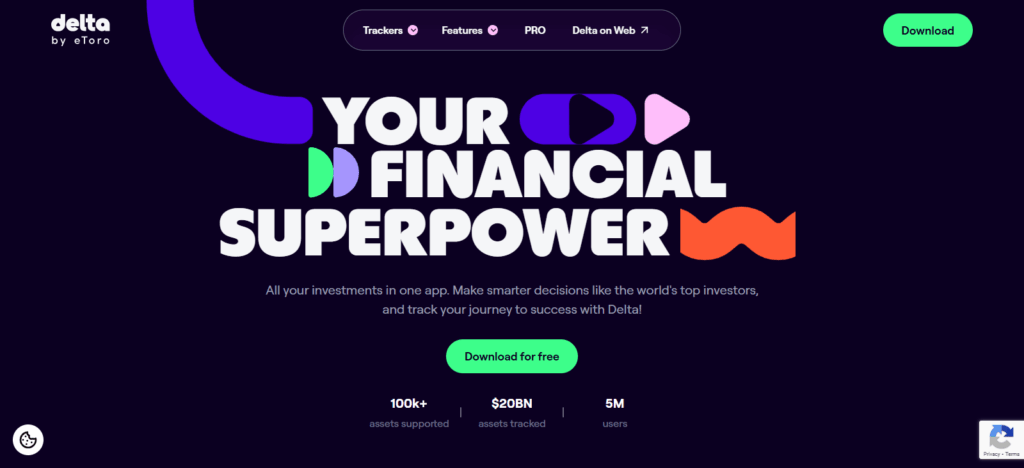
She also appreciates the user friendly interface and added features of performance analytics. Delta allows tracking of dividends, choreography of portfolio diversification, and syncing with brokerages and wallets.
There is a free version which Delta Pro which starts at $8.49 a month. This is for advanced mechanisms, unlimited connections and primary user support. As a stock portfolio and investment tracker, Delta is tailored for high mobility clients who wish to manage their assets with a mobile device.
Delta Investment Tracker Pros & Cons
Pros.
- Tracks prices for stocks, cryptocurrencies, and ETFs in real time.
- Gives in-depth analysis and metrics for portfolios.
- Easy to use with customizable interface.
- Pro version adds data for extended trading hours.
Cons.
- Few exchange/broker connections.
- Numerous users have stated that syncing takes too long.
- Free version does not have some functionalities.
- Additional features must be paid for.
7. CoinStats
CoinStats is one of the best portfolio trackers for cryptocurrencies and digital assets and also supports traditional assets and investments due to its numerous integrations with exchanges, wallets, and DeFi protocols.
It is one of the most popular options for crypto investors who aim to effectively synthesize and analyze their holdings on numerous platforms in a centralized manner.
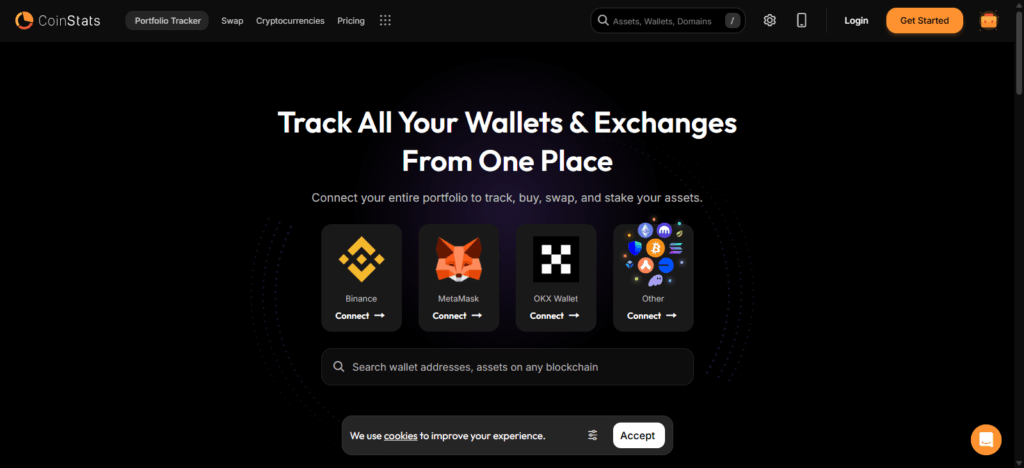
CoinStats provides a plethora of services including live price tracking, portfolio performance evaluation, tax report generation, and DeFi data analytics. The basic version is free and only permits minimal tracking, whereas CoinStats Pro (from $3.49/ month) provides unlimited wallets, exchange connections, and even more features.
For stock and investment portfolio trackers, CoinStats is most suitable for users who primarily manage crypto investments, and would also like to track their stock and fiat investments.
CoinStats Pros & Cons
Pros.
- Supports connections with 350+ exchanges and wallets.
- Gives real-time price updates and analytics on portfolios.
- Has tax report features.
- Has an application for mobile users.
Cons.
- Premium features need payment.
- Supports the users who mention issues with synchronization.
- Coverage on some cryptocurrencies is limited.
- Advanced features are not user-friendly.
8. Sharesight
Sharesight is a portfolio tracker tailored for decentralized investors who wish to have in-depth performance and tax documentation on their portfolio. It supports the tracking of stocks, ETFs, mutual funds, and dividends on more than 40 exchanges and across numerous countries.
Sharesight is best suited for investors who need to track capital gains, dividends, and currency movement with ready-to-file tax reports. The free version is very basic and supports only 10 holdings.
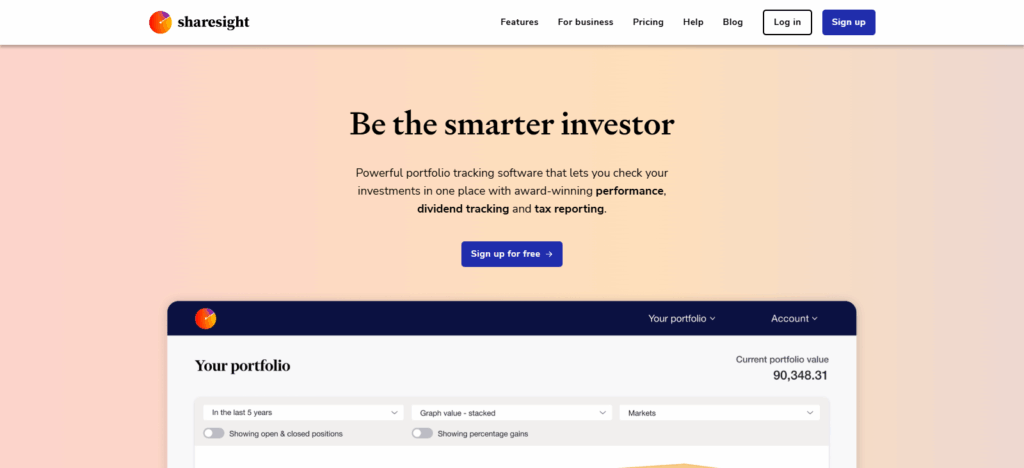
While the premium versions (from $15 a month) have no limits on the number of holdings, advanced analytics, and comprehensive reporting.
For stock and investment trackers, Sharesight is extremely beneficial for cross-border investors who need refined tax documentation and dividend income tracking.
Sharesight Pros & Cons
Pros.
- Tracks the price and performance of assets, and the dividends paid.
- Has tax report features.
- Provides customizable reports for portfolio evaluation.
- Ideal for long-term investors who focus on dividend income.
Cons.
- Limited basic plan, full functionalities requires payment.
- New users face challenges for the first time.
- Does not integrate with some brokerages.
- Does not currently have a mobile app.
9. Zerion
Zerion offers a portfolio tracker in a Web-3 environment made specifically for DeFi and NFT investors. It offers real-time tracking of wallets and tokens and yield farming positions and directly connects with Ethereum, Polygon, BNB Chain, and other networks.
Crypto users in need of a non-custodial and private dashboard with profound DeFi integrations will find Zerion most useful.
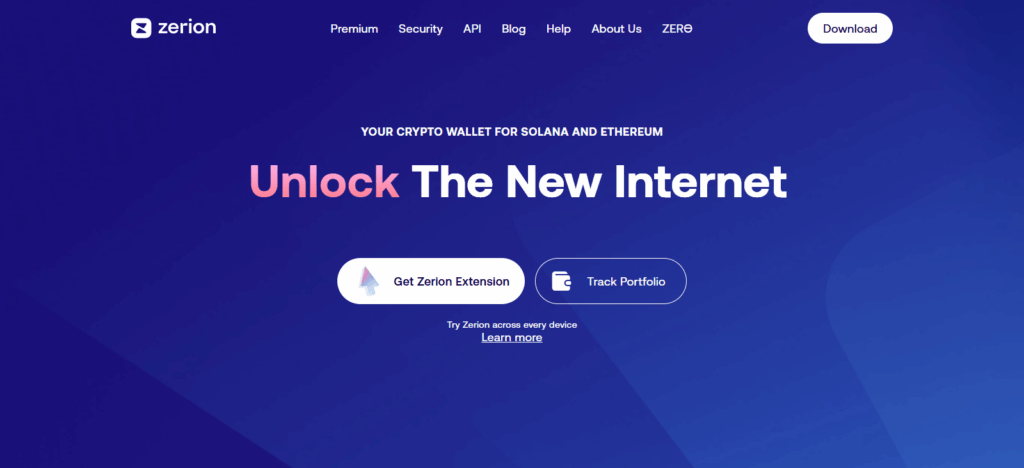
The service is free of charge and provides web and mobile apps featuring portfolio analytics, history of transactions, and wallet connections.
For users who want to maintain control and privacy, and manage their on-chain assets with no custodial risk, Zerion is perfect for them.
Zerion Pros & Cons
Pros:
- Real-time data and analytics.
- The only app that lets a user track DeFi assets over several protocols.
- The app has a feature that allows tracking even when you are not stationary.
- Easy and uncomplicated design.
Cons:
- Shallow coverage of customary assets.
- Quite possibly intricate for first-time users.
- Possibly behind a paywall for a subscription model.
- Connection to certain services is not well developed.
10. Stock Rover
For investors and analysts, Stock Rover is advanced research software that offers powerful portfolio analysis. It provides ETFs, stocks, and mutual funds with advanced performance metrics, valuation models, and other appraisal tools.
We find that Stock Rover is most useful for fundamental investors who seek to analyze financial data down to the core and refine their portfolios to their investment strategies.
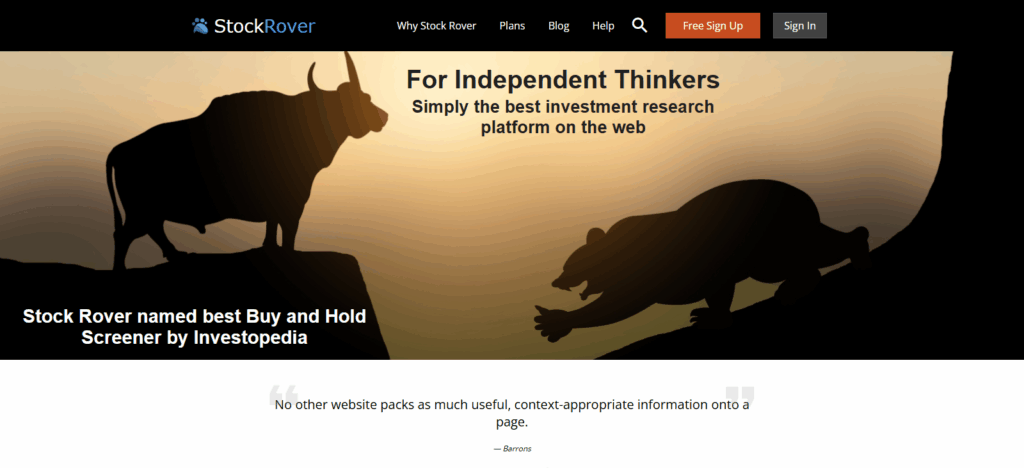
The free edition offers limited capabilities, while the premium editions (from $7.99/month) provide unrestricted access to portfolio analytics, research reports, and screeners.
For stock portfolios, Stock Rover offers unmatched versatility and customization for equity research, followed by investment trackers.
Stock Rover Pros & Cons
Pros:
- Elaborated stock screening and analysis tools are available.
- Supports the management of the user’s portfolio.
- Ability to backtest investment strategies.
- Connected live to brokerage accounts for real-time investment tracking.
Cons:
- Full access is behind a paywall.
- Beginners will likely find the platform unsophisticated.
- Advanced users face a certain amount of tools that must be learned.
- Certain asset classes are lacking.
Conclusion
To sum up one’s investment and portfolios trackers there investment goals and expertise plays a vital factor for proper allocation and utilization of the tools. For example Seeking Alpha and Stock Rover offer a great value for research portfolios.
Empower and Personal Capital Kubera serves a more all encompassing asset view and long term asset planners and to high-net worth clients. CoinStats and Zerion offer robust crypto portfolio trackers.
For dividend portfolio investors Sharesight and Delta Investment Tracker work seamlessly. Yahoo Finance and Morningstar are two trackers that can be used by casual investmenters all the way to serious ones. Correct investment tracking leads to optimised decisions return accuracy in assessing portfolios.
FAQ
What is a stock portfolio tracker?
A stock portfolio tracker is a digital tool or platform that helps investors monitor the performance of their investments, including stocks, ETFs, mutual funds, crypto, and other assets. It allows users to track real-time prices, calculate returns, analyze asset allocation, and generate reports for better decision-making.
Why do I need a stock portfolio tracker?
A tracker consolidates all investments in one place, saving time and reducing errors. It helps investors make informed decisions, identify underperforming assets, manage risk, and monitor dividends or tax implications efficiently.
Which is the best stock portfolio tracker for beginners?
Yahoo Finance and Empower (Personal Capital) are ideal for beginners due to their intuitive interfaces, free access, and easy-to-understand analytics.
Which tracker is best for advanced investors?
Advanced investors may prefer Seeking Alpha, Stock Rover, or Morningstar, as they provide in-depth research tools, stock screening, and portfolio analytics.
Can these trackers handle multiple asset classes?
Yes. Platforms like Kubera, Delta Investment Tracker, and Sharesight can track multiple asset classes, including stocks, crypto, ETFs, real estate, and bank accounts.


